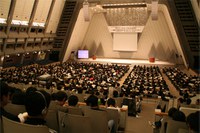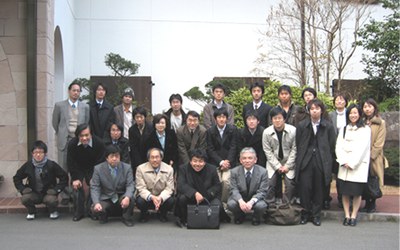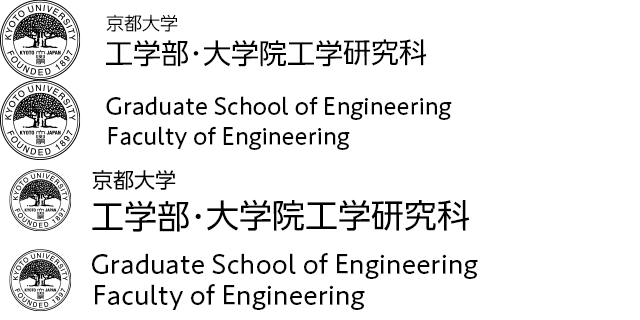Science and Math Student Support Project
Global Leadership Engineering Education Program
Training science and technology leaders for the international community
The Faculty of Engineering offers a special engineering curriculum designed to foster global leaders equipped with the advanced creativity and problem-defining capabilities, planning skills, and capacity to effectively execute ideas needed to play leading roles in shaping the development of science and technology in today's world. Such individuals will help to overcome and solve some of the many problems faced by the international community, and contribute to the sustainable development of humanity.
Students with outstanding talents and ambition in the field of science and mathematics
After graduating from one of the six departments of the Kyoto University Faculty of Engineering, students with outstanding talents and ambition in the field of science and mathematics are expected to pursue cutting-edge science and technology studies in their field of specialization -in the Graduate School of Engineering, Graduate School of Energy Science, Graduate School of Informatics, or the School of Global Environmental Studies- in order to cultivate the sophisticated leadership skills that will enable them to significantly contribute to solving international problems through the application of science and technology.
The Kyoto University Faculty of Engineering offers Global Leadership Engineering Education as a supplement to specialized technical education in order to cater to the career aspirations of ambitious students.
Aims of "Global Leadership Engineering Education"
According to the results of a 2003 questionnaire survey of fourth-year engineering students at eight universities in Japan (Hokkaido University, Tohoku University, The University of Tokyo, Tokyo Institute of Technology, Nagoya University, Kyoto University, Osaka University, and Kyushu University), students at this level are very aware of the importance of adapting to different cultures, of interdisciplinary abilities, of the abilities (e.g., English language skills) needed to work in international environments, and of possessing a broad knowledge base. However, a large proportion of the students rated themselves poorly in these areas.
With these results in mind, the Faculty of Engineering strives to develop a new curriculum for engineering education that runs parallel to the process of accumulating basic knowledge of specialized disciplines and learning practical research skills. This new stream of education aims to enable students to develop enhanced international communication skills for science and technology-based work, and cultivate technologists who can demonstrate global leadership. In this early phase of the 21st century, humanity is facing a rapidly growing number of global-scale problems -relating to the environment, energy, water, food, disasters, and epidemics- that can be overcome only by means of a scientific and technological approach. In view of this, the time has come for a new approach to engineering education that strives to develop technical leaders capable of comprehensively understanding the essence of these difficult problems -which are expanding in scale, particularly in developing countries- and of taking the courageous initiatives needed to begin solving these problems, for example, by means of a diplomatic framework that actively makes use of Japan's science and engineering expertise in the global community.
To address this urgent need, the Faculty of Engineering conceived of the Global Leadership Engineering Education Program and set up a program steering committee, made up of current or past heads of the six departments of the faculty, to tackle the task of developing the new curriculum. Carefully taking into account the career path of science and mathematics students, from high school to the Kyoto University Faculty of Engineering, and then on to one of the four engineering-related graduate schools of the university, the committee has developed a common curriculum for Faculty of Engineering students, aimed at implementing a year-by-year Global Leadership Engineering Education that is consistent over the four years of the undergraduate program.
Introduction to advanced engineering leadership: "School of Intellectual Giants"
 The first-year subject "School of Intellectual Giants" is run in the format of an intensive series of lectures over a three-day period just before the end of first semester. The lectures are given by invited speakers who have distinguished themselves as "giants" in different fields of science and technology. In addition, as an introduction to this subject, a memorial lecture is provided for first-year students before their enrollment ceremony, to explain the goals of the "Global Leadership Engineering Program" and to provide an outline of the program curriculum. The memorial lecture in 2008 was held at the Kyoto International Conference Center. In addition to 978 incoming first-year engineering students, the lecture was attended by invited high school students from around the Kinki region. The invited speakers for this event were Dr. Koichi Tanaka, the 2002 Nobel Prize Laureate in Chemistry (currently a visiting professor at Kyoto University), and Renate Christ, secretary of the Intergovernmental Panel on Climate Change (IPCC), the group awarded the 2007 Nobel Peace Prize. The theme of the event was "Technoscience in Support of the Earth and the Future of Humanity." The speakers discussed the expected role of science and technology in overcoming wide-ranging and critical global-scale challenges.
The first-year subject "School of Intellectual Giants" is run in the format of an intensive series of lectures over a three-day period just before the end of first semester. The lectures are given by invited speakers who have distinguished themselves as "giants" in different fields of science and technology. In addition, as an introduction to this subject, a memorial lecture is provided for first-year students before their enrollment ceremony, to explain the goals of the "Global Leadership Engineering Program" and to provide an outline of the program curriculum. The memorial lecture in 2008 was held at the Kyoto International Conference Center. In addition to 978 incoming first-year engineering students, the lecture was attended by invited high school students from around the Kinki region. The invited speakers for this event were Dr. Koichi Tanaka, the 2002 Nobel Prize Laureate in Chemistry (currently a visiting professor at Kyoto University), and Renate Christ, secretary of the Intergovernmental Panel on Climate Change (IPCC), the group awarded the 2007 Nobel Peace Prize. The theme of the event was "Technoscience in Support of the Earth and the Future of Humanity." The speakers discussed the expected role of science and technology in overcoming wide-ranging and critical global-scale challenges.
Advanced Engineering English Workshop
This seminar combines online self-study systems that can be used from home with direct communication with teachers to enable students to learn how to use technical English terminology for effective international science and technology-related communication, and for improving verbal speaking and expression skills.
Advanced Engineering Leadership Training Program, "School of Intellectual Adventure I"
This training is designed for second- and third-year students, selected according to prescribed criteria, from a perspective that emphasizes practical learning more than passive learning. Through practical experience, students learn about the evolutionary flow of science and technology, and the connection of this to history and culture, through training in the production lines and product development studios in manufacturing enterprises utilizing advanced science and technology, and through participation in various kinds of international conferences held in Kyoto.
Advanced Engineering Leadership Training Program, "School of Intellectual Adventure II"
This training is designed for fourth-year students, selected according to prescribed criteria. In this training students collaborate with external organizations such as Nissan Science Foundation and the World Bank, and they work together in small groups to independently identify issues and conduct survey activities. As a trial for this training subject, a "junior" version of the program was run during a residential seminar held for participants (middle ranking engineers employed by corporations with approximately 10 years of practical work experience since graduating from a faculty or graduate school of engineering and university academics of similar age) in the Nissan Leadership Program for Innovative Engineers (Nissan LPIE) -a leadership training program for innovative young scientists and engineers run by the Nissan Science Foundation. A total of 11 fourth-year students who passed an essay examination participated in this "junior" version of the training program. During the seminar these students were divided into three groups for discussions based on key words in order to gain experience in the processes of identifying issues and summarizing proposed solutions to the problems.

